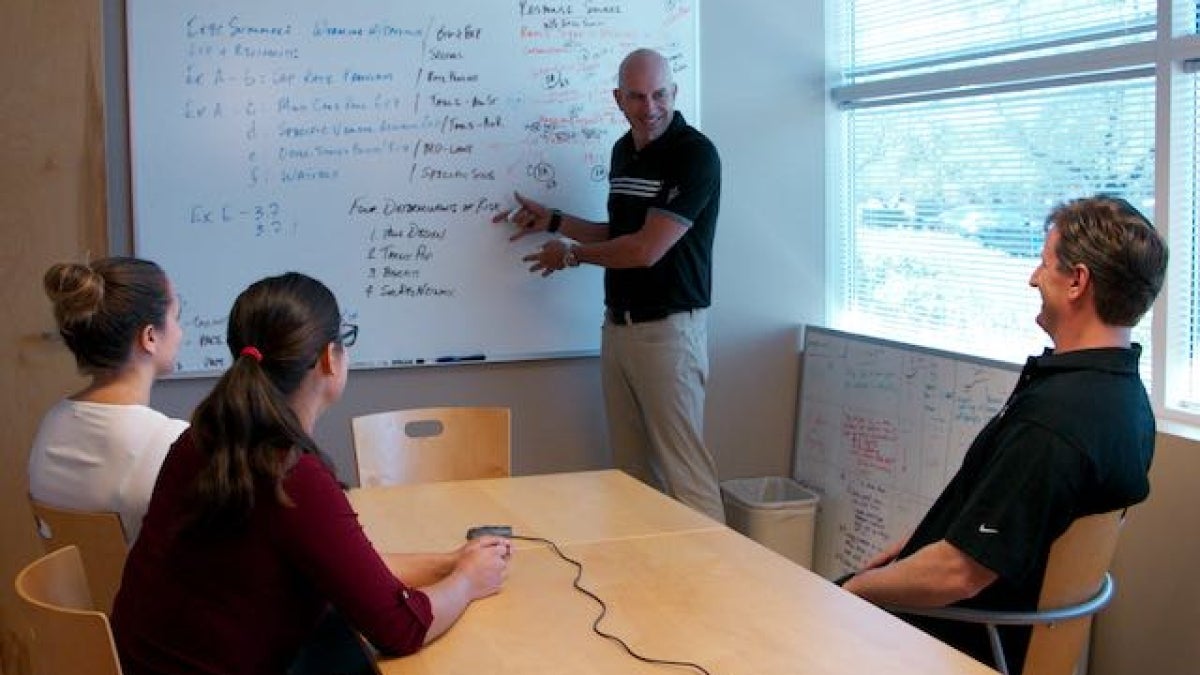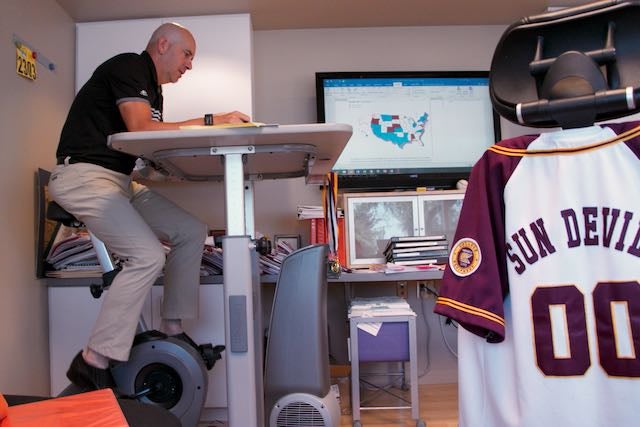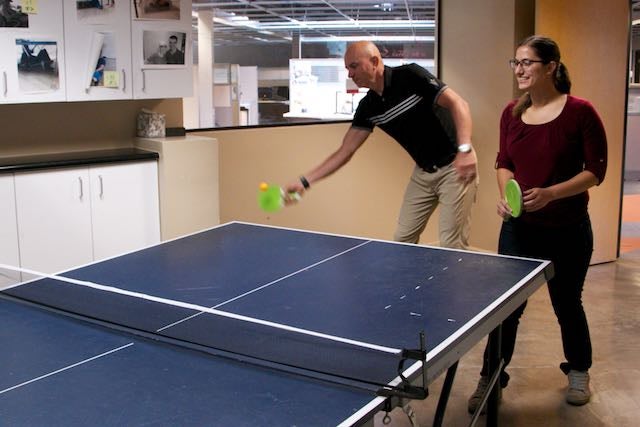Giving back: Alum expands ASU partnership with Optumas Actuarial Science Scholarship

CEO Steve Schramm shares his ideas with Optumas team members (from left) Rachael Rhodes, Stephanie Taylor and Tim Doyle.
Steve Schramm started out at Arizona State University as a chemistry major and wanted to go to law school. After struggling with some of his early science classes, he asked for advice from one of his professors. If he wanted to be a lawyer, the professor steered him toward a degree in economics.
In his junior year, Schramm again asked for advice, this time about his resume. The professor said it looked a little light and suggested he look into internships.
ASU was able to line up two consecutive internships. One was with the Arizona Health Care Cost Containment System (AHCCCS), Arizona’s Medicaid agency.
Schramm’s first day interning at AHCCCS was also the first day of the new state Medicaid director at that time, who took him under his wing and said, “Young man, I think you have a future in health care.”
Nearly 30 years later, Schramm and his company Optumas are providing the same kind of life-changing internships to students in ASU’s actuarial program and are backing them up with a newly endowed scholarship.
“ASU gave me the opportunity for multiple internships, and so it was easy for us to say we want to have a partnership with the School of Mathematical and Statistical Sciences and the actuarial program. It’s a natural extension of what ASU did to help me become successful,” said Schramm.
It was Tim Doyle’s idea for Optumas to expand their relationship with ASU by making an investment in the actuarial program in the form of endowing a scholarship. He is a senior actuary at Optumas and member of ASU’s actuarial advisory board.
“The benefit that we’re going to get is more of the students in the actuarial program will have a better understanding of what Optumas does. We’ll have an opportunity to expand our relationship with the program,” said Doyle.
Schramm agreed it was an easy decision. “We’ve had such good luck with the interns we’ve gotten from ASU. So any ability to raise our visibility with the actuarial program is a no-brainer.”
“It’s very proactive. We now have fantastic interns brought to us. The team at ASU’s actuarial program is saying, we’ve got this person who has a really incredible academic background and they’ve expressed an interest in health care, so we think they’re the perfect match for you.”
“It’s great because it saves us time and effort. As an employer, you have to focus on getting your job done while you’re growing the business and while you’re doing all these other things. To have somebody help us be successful, it’s an easy decision.”
ASU’s actuarial science program excels at matching soon-to-be graduates with employers. In fact, two-thirds of its students who will graduate next May have already secured full-time positions after completing their internships over the summer.
This success is a credit to program coordinator Jelena Milovanovic, PhD, who works hard to build meaningful relationships with local actuarial companies and gets them involved in every facet of the program.
With the Optumas Actuarial Science Scholarship, the company is looking for well-rounded students. It is placing less emphasis on grade-point average and wants students who are willing to challenge themselves.
“Students going down an actuarial track bring a special amount of desire because of the amount of extra work that is associated with it,” Schramm said. “ASU is doing a fantastic job at producing prolific exam takers. The exam process is hard. The preparation that they get is spot on. That’s what we’re very excited about.”
He is enthusiastic about his company’s expanding partnership with the university. “ASU was such an important part of my development into who I am.”
“One of the things we talk about at Optumas is, we want to make sure this is a great community that we live in. To be in a great community, you have to give back. That’s our responsibility as stewards of this community. We have to give back.”

“I’ll be on conference calls and sit there and spin, listen in and provide feedback,” he said.
There’s an ASU baseball jersey draped over his chair. Baseball was the first sporting event Schramm attended when he went to ASU. He even caught a baseball at that first game.
“I’m a huge baseball guy,” he said with a smile.
Schramm and a partner founded Optumas in 2006 with the desire to change the way health care is delivered. The company employs about 30 people, with plans to expand to 50 to 75 employees.
“We are firm believers in the fact that everyone has a fundamental right to quality health care,” Schramm said.
“What we want to do with our consulting work is make it so more people have access to quality health care because that’s what makes you a productive member of society.”
This sentiment echoes what ASU President Michael Crow has promoted in the university’s charter as “a comprehensive public research university, measured not by whom we exclude, but rather by whom we include and how they succeed.”

Schramm credits ASU for helping him achieve his career goals.
“What I found at ASU was a very welcoming, open group of academics, support personnel and students that were all about ‘What can we do to put you in a position to succeed?’”
ASU also provided Schramm a sense of community. “It’s such a big school and yet you can still feel like it’s a small community. I have friends that I met at ASU that I still stay in regular contact with.”
Optumas enjoys partnering with ASU because of the quality of the individuals they’ve been able to find. “We’re a relationship-based consulting firm. And our relationship with ASU and the actuarial program is exactly what we need. We want somebody who’s going to think about what our business is all about, and then help steer students and graduates to us that are going to make us successful.”
“At Optumas, we turn students into consultants. The way we do that is we are a very flat organization. I still consult. Our credentialed actuaries still consult. We work directly between actuary and analyst, there’s no in between. We get down and work right there with you, talking about the data, talking about the analytics and the communication of our analyses.
Schramm and his team at Optumas are making life better for people.“We make certain that the most vulnerable of American society have access to quality healthcare.”
So why would a student want to intern or work at Optumas?
“You’re going to make a difference in the world — on a scale of millions of people.”
More Science and technology

ASU and Deca Technologies selected to lead $100M SHIELD USA project to strengthen U.S. semiconductor packaging capabilities
The National Institute of Standards and Technology — part of the U.S. Department of Commerce — announced today that it plans to…

From food crops to cancer clinics: Lessons in extermination resistance
Just as crop-devouring insects evolve to resist pesticides, cancer cells can increase their lethality by developing resistance to…

ASU professor wins NIH Director’s New Innovator Award for research linking gene function to brain structure
Life experiences alter us in many ways, including how we act and our mental and physical health. What we go through can even…